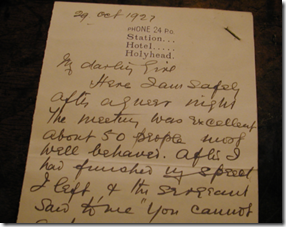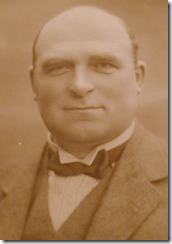 With storms – and even better, rumours of storms – helpfully filling the usual holiday season news vacuum, I thought the letter transcribed below might be of interest. By a strange coincidence, my wife came across it today when sorting through some old family papers.
With storms – and even better, rumours of storms – helpfully filling the usual holiday season news vacuum, I thought the letter transcribed below might be of interest. By a strange coincidence, my wife came across it today when sorting through some old family papers.
It is a letter from her grandfather to her grandmother on the eve of a trip to Ireland (from whence he came) and the night after addressing a local political meeting on his way to the port of Holyhead. The causeway he mentions is unchanged; a mile long embankment about 20ft high with the sea on one side, a road halfway up the other side, and a railway line on top. The weather was not very good.
The Station Hotel
Holyhead
29th Oct 1927
My darling Girl
Here I am after a queer night. The meeting was excellent, about 50 people, most well behaved.
After I had finished my speech I left and the sergeant [of police?] said to me “You cannot go home, all roads are under water; hopeless”. I said “I’m going to Holyhead. Which is the safest road? By Bethgelert or Portmadoc? He said “Portmadoc”. I went.
Reached the gate to causeway. Gatekeeper said “all safe”, though an awful storm was blowing. I went on. Soon I found sea was breaking over railway bank & falling on road. Car was swamped, engine stopped. I got out into a sea of spray& foam. Walked back, met three men who wanted to get to Portmadoc. Agreed to walk together. I started first, they followed – but I presume they went back as I did not see them again.
The noise & screaming of wind & sea as it plunged over railway and down on top of road, and myself included, were awful, and most frightening. Water was over knee deep on road, stones, rocks, galv’d. [galvamised] iron sheets from fences, were also on the road. I stumbled on, fell down in water several times, tripping over rocks and stones.
Many cars lay helpless on road all empty except one in which there was a girl frightened out of her life. Her companions had left her. I got into car and sat a while as I was nearly done up. Then we both got out into about 2 ½ to 3 ft of water, walked on to Portmadoc. I went to Sportsman Hotel, borrowed pyjamas, went to bed. They dried my cloths splendidly.
This morning took out men to car. Got it going again without much difficulty. Came on here. Asked sergeant in Penrhyn to let you know. All wires are down. They say living man never saw such a state of affairs. When I saw the road that I had struggled over last night in daylight I wondered how I am alive. Don’t see how it can be cleared for days. People who I met cannot understand how I got through.
I am crossing by 2.30 boat today. My clothes are the worse of the wear and I had to buy a new hat here. Luckily what are in bag are dry.
In greatest haste & best love
Yours
Pat
Hope your meeting went off well. The bridge at Penrhyn is down, all trains and road traffic stopped. Trees across roads everywhere. They had my road cleared however in time for me to pass.
My wife’s grandfather, as I remember him, was a vast man who possessed great strength of character, energy, and business acumen. Having survived constant danger during the Irish ‘troubles’ of the early 1920s, it is unlikely that he was easily scared. We still have his hip flask, a very fine example sheathed in crocodile skin with silver mountings. It is of 1 quart capacity.


A fascinating story, Tony, especially in light of all the usual claims of unpredecented, weird, etc., weather flying about the media, these days. I found a newspaper report from 31st October 1927 (AP news item carried in the Schenectady Gazette of that date) which bears out your wife’s grandfather’s account (Google newspaper archive link is a bit unwieldy, so I’ve saved the cutting on Flickr and then saved that link as a tinyurl):
http://tinyurl.com/p9zftlv
The newspaper item describes a gale that seems to have cut a swathe of destruction across Ireland, sinking fishing boats (15 drowned, 38 missing, as per that date), stripping roofs from houses, bringing what the newspaper describes as a hurricane to Waterford and coinciding with a tidal surge 6 feet above normal in Limerick, causing the river Shannon to burst its banks and leading to flooding and more destruction of property.
I’ve often thought that if human beings typically lived for several centuries and had perfect memories throughout that span of time, we’d hear very little talk of “weird weather”, as it would usually reveal itself to be the same old sort of weather we’d recall from 90-odd years ago.
Very many thanks for the link to the cutting which I will print out and attach to the letter. It’s interesting that such a story at that time seems not to have made it into the front-page headlines, also that there is no claim about it being a particularly rare event. Unusually bad weather was just something that was expected to happen from time to time in those days.
My favourite quote from the BBC’s coverage of the recent bad weather was a breathless Radio 4 news report claiming that the storms had caused ‘widespread disruption over parts of the country’. I suppose that the cost of all those very clever senior executives who run BBC News leaves insufficient funds to employ a few competent sub-editors who would gleefully leap on such a stupidity. Or perhaps the BBC just doesn’t dare tell its reporters they are writing drivel.
Thank you, TonyN, for this excellent piece of history and human drama from 1927. And thank you, Alex Cull, for the digital weather references to corroborate the story and add to the effectiveness of Tony N’s message. I lived in North Dakota (the northern-most part of the US in the Great Plains — just south of the Canadian Manitoba border. We saw some fierce winter blizzards and experienced some true arctic blasts (with wind chills to -80F. Some winters were rather “mild”–only getting to -20 or -30F. To see the doom-and-gloom weather reports now about the “polar vortex” and killer ice storms make it sound like these types of things have never happened before. But as your letter proves, all types of weather does happen over and over and over again–we just don’t necessarily remember it, or we live in a place that takes it for granted that some winters or summers or autumns or springs are going to be another bad year for storms. It angers me that global warming alarmists/activists with assistance of the media and education systems frighten people into submission to their beliefs. Thank you again folks. Keep warm and dry!
Well done indeed Tony.
There’s a site run by Steven Goddard which I’m sure you’ll enjoy & which may be useful For historical context.
stevengoddard.wordpress.com
Cheers,
JD.
Excellent article! Our understanding of what causes storms is still in its infancy. But maybe not for long. Read the comments here:
http://goo.gl/QwkjcQ